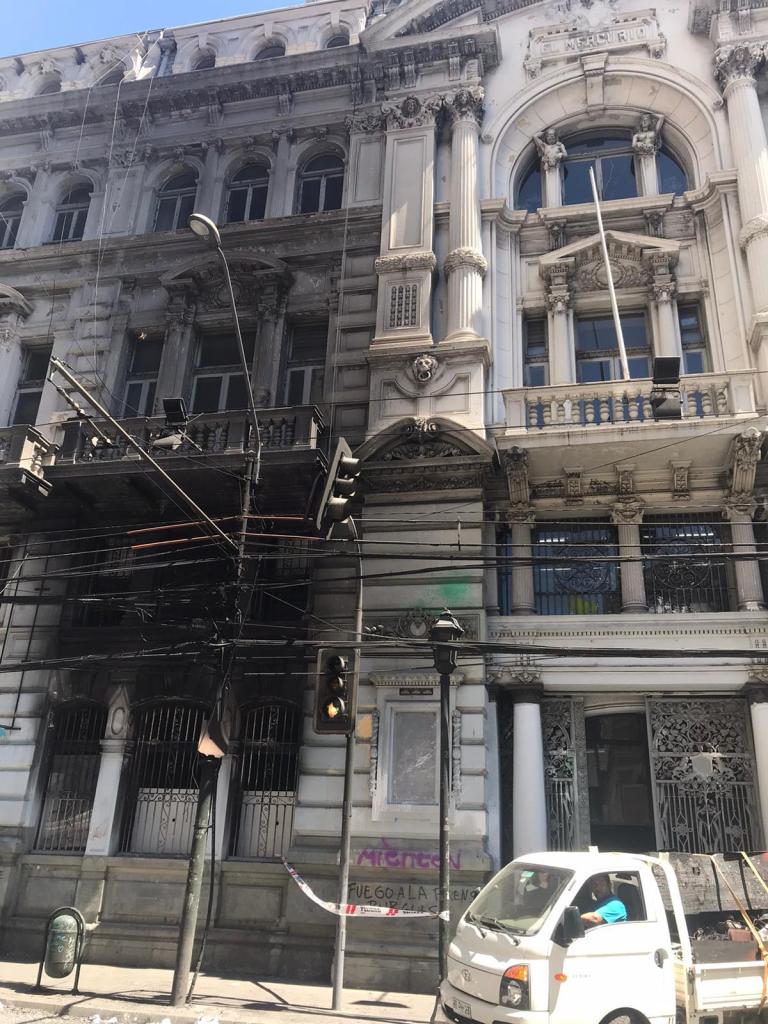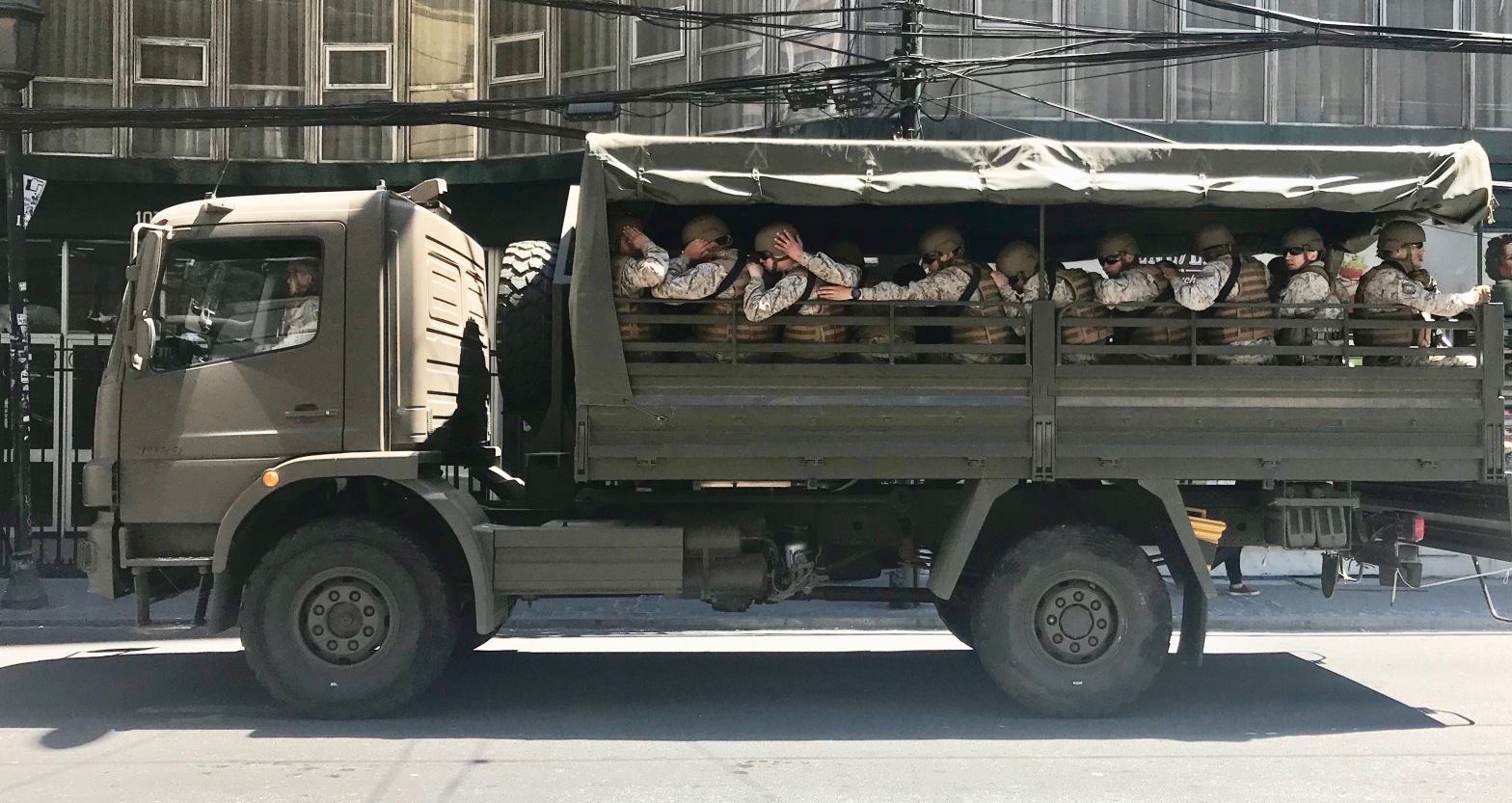The Saturday night curfew in Valparaíso ended at 7 AM Sunday. But by the time we made it down from the cerros to el Plan in mid-afternoon Sunday, the tear gas had still not blown away. As we walked through Plaza Victoria (a major public space), we were actually blinded and choking. The center of Valparaíso was eerily empty. Nearly every store was shuttered and the funicular we tried to take up to the cerro was closed. Carabineros (Chilean military police) patrolled the streets in trucks.

A large Unimarc supermarket had been completely incinerated. We went by the regal building housing El Mercurio, the notorious right wing newspaper that supported and helped create the coup in 1973, supported the dictatorship, and continues to be the mouthpiece of the right. It had serious fire damage. Mostly, the people who stopped to look and take pictures were smiling.

By Sunday night, President Piñera had declared a state of emergency in eleven regions of Chile as demonstrations spread nation-wide. By 1PM thousands had gathered in Plaza Ñuñoa in Santiago banging pots. The same happened in communities throughout the Santiago area. By end of day, CNN-Chile reported 716 people were detained, 22 wounded and taken to hospital, and a number dead from fires that engulfed several supermarkets in the Santiago region. The airport is in chaos with flights suspended. While CNN constantly looped videos of burned out supermarkets, there was no mention of people injured or killed by the carabineros and milicos (army) even though video circulated on Twitter and Facebook.
With the Sunday night 8 PM military curfew in effect you can’t go out, but you can bang on a pot. Standing on our little balcony in the cerro, the city was alive with the cacerolazos (people banging pots) in protest of the regime. Everyone we’ve talked with says life under this system is insupportable—the cost of fuel, food, housing, transportation, water, the privatization and greed of the corporations, the low wages and unlivable pensions. A worker in our apartment building stopped us this morning to say just that…and that he supports peaceful protests, but not the looting and burning.
This is a very volatile situation. In our opinion, the struggle right now is for the political narrative—to either target all the inequalities and injustices produced by neoliberal capitalism and the right-wing government and push for real political and material changes—or to shift the focus to national unity targeting acts of vandalism. Through their protest to evade the transit fares, the young people put at the center of political life opposition to a whole system of gross inequality and injustice that people have endured for so many years. As Francisca Perales, from the Chilean Social Convergence party, said today on Democracy Now!, the protests are a response to years of injustice. People have had enough of a country ruled by the elite for the elite.

Piñera is trying to shift that narrative to national unity and order. Piñera and other government officials constantly drummed home that point on national TV: “We are all in this together against the delinquents and vandals. People should return to their homes so we can restore order.” They are trying to divert the discussion to the burning of supermarkets and trashing the metro (which TV news stations loop constantly). This narrative takes the focus off the government, diverts from the actual grievances, and justifies the state of emergency. On Sunday, in a scene reminiscent of Pinochet during the coup, surrounded by military, Piñera declared, “Estamos en guerra” [“We are at war.”]

The official drumbeat condemning acts of violence negates the violence that started this whole thing—violent repression against school children protesting a transit fare increase that would hurt their families. It negates the violence of thousands of fully armed military on the streets, in tanks and trucks, fire hosing, beating people, detaining hundreds. It denies the violence of privatizing public goods—water, schools, electricity—by private corporations, the violence of pensions so low that retirees cannot survive on them, the violence of poverty and daily abuse—the violence of capitalism on steroids.
Moreover, the official narrative stokes fear to justify the state of emergency and frame the crisis as something like a natural disaster where we all have to pull together. Piñera claimed there are organized groups (cells) planning worse violence. “Es un enemigo poderoso (…) Estamos conscientes que son grupos organizados (…) Sabemos perfectamente lo que están preparando para mañana.” [“It is a powerful enemy … We are aware that they are organized groups … We know perfectly well what they are preparing for tomorrow.”]. This fear mongering seems to us to be working. The local farmers market we go to on Mondays was closed and a friend told us only a few grocery stores in el Plan are open, with long lines.
People on the left have also questioned who is behind the torching and vandalism. The targets are El Mercurio, banks, insurance buildings, Walmart supermarkets, car dealerships—symbols of the theft of people’s wealth and livelihoods, but also public goods—metros, buses, neighborhood ferias (open markets), even a school in one city. (Would people in the community really torch their own school or their transportation to work?) Of course, we don’t understand all the reasons for all the actions, but concretely, destruction of public goods makes it hard on working people. People don’t know how they are going to get to work. “I’m for the demonstration, of course, but not the destruction”—a woman cleaning up the metro stop in her neighborhood said.
Our Chilean friend sent this comment (English below):
Nos estamos enfrentando a la doctrina del Shock [vieja táctica gringa]
1. Impedir que la gente se traslade para causar el caos [por qué se quemaron sólo las estaciones de la periferias… Por qué no en las Condes]
2. Desabastecimiento: saqueo de supermercados y ferias libres [si bien el lumpen siempre ha existido, es extraño que las fuerzas armadas y carabineros no hayan parado los saqueos]
3. Destruir los bancos y cajeros automáticos [el ciudadano común y corriente se queda sin el efectivo para poder comprar]
4. Cortar la luz, para mantener a la gente desinformada [las redes sociales han sido importantes]
5. Cortar el agua… La gente se desesperará y pedirá a gritos que el gobierno intervenga y apoyará la represión.
Propósito: la gente se vuelve en contra de la gente y el gobierno justifica su accionar violento y mantiene el Status Quo…
We are confronting the Shock Doctrine [an old gringo tactic]
1. Prevent people from moving to cause chaos [why were only the stations in the peripheries burned… Why not in the rich neighborhood]
2. Shortage: looting of supermarkets and open markets [although the lumpen has always existed, it is strange that the armed forces and carabineros have not stopped the looting].
3. Destroy banks and ATMs [the ordinary citizen runs out of cash to be able to buy]
4. Cut the electricity, to keep people uninformed [social media has been important]
5. Turn off the water… People will despair and cry out for government intervention and support repression.
Purpose: The people turn against the people and the government justifies its violent actions and maintains the Status Quo…
So will the unions, student organizations, left political parties, other mass mobilizations be able to put again at the center the demands for a decent and dignified life?
We end with an important video of Jorge Sharp, leftwing mayor of Valparaíso, from today, surrounded by members of civil society in Valparaíso, denouncing the military intervention and demanding a political solution based on the demands of the people. Here is a very rough English translation:
Sharp begins by announcing the many civil society organizations, unions, small businesses, pensioners, workers, feminists, democratic political parties—people of Valparaíso—we are all here today in Valparaíso, and making a statement to Piñera: Valparaíso no está en guerra! [Valparaíso is not at war.] (Followed by spontaneous chants from the crowd of Valpo no está en guerra!) Valparaíso is for life. Valparaíso is for democracy. Valparaíso is for liberty. For all of Valparaíso, for all of Chile. For all the people who are peaceful from the mountains to the sea, the country, the cities, the unions. Not for 30 pesos [it’s for more than the 30 pesos fare hike]. It’s for 30 years of injustice and abuse. Today we have a social conflict, not generated by the people, not generated by the organizations of the territory. It’s generated by politicians who are not listening. The solution, President Piñera, is not to invade the streets. Get the military off the streets. Get the military out of the communities. Military isn’t the solution. Because we believe the solution to the conflict is dialogue with the people, the proposals that have been constructed from the base of the people, from Valparaíso and from all the cities of Chile. From people who don’t want more injustice and abuses. Military in the streets is synonymous with violence. We don’t believe that we have a conflict that can be solved by the military. It can be solved with democracy, dialogue, and encounters. You said we are at war and all of Chile responded with cacerolas saying we are not at war Mr. President. We have to defend the life, our democracy, our cities, from people like you.
As we post, a massive demonstration with families and people from all walks of life has formed in Plaza Italia in Santiago in advance of the 8PM curfew tonight…And our city, Valparaíso, has already started its 6 PM curfew until tomorrow morning, though we can hear military helicopters over the city while the sun shines brightly over the Pacific Ocean from our cerro view.


3 thoughts on “The People of Chile Are Not at War! – A Struggle for the Narrative”